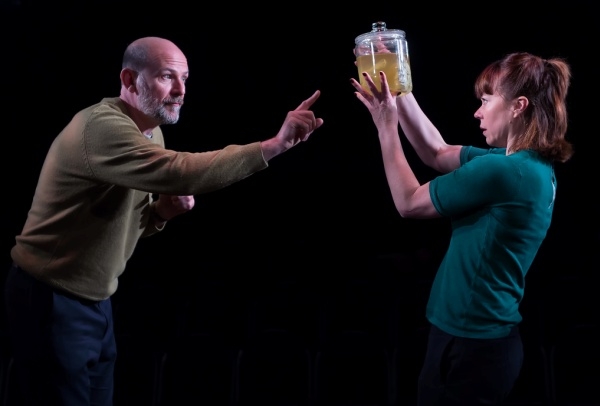
© Bill Knight
The human brain, Nick Payne‘s new play suggests, is a storytelling machine. So, of course, is the theatre. It’s a link that Incognito grasps, stretches and manipulates throughout the course of its swift 90 minutes, cleverly using the entire dramatic framework of the piece as a metaphor for the ways in which our minds frantically connect – or fail to connect – the dots.
The isolated narrative points which we scrabble to join up are located along three distinct strands, separated by time but linked in their preoccupation with the workings of the mind. Along one, we follow the obsessive experiments of Thomas Stoltz Harvey, the man who stole Albert Einstein’s brain after performing his autopsy in 1955. Another tells the poignant story of severe amnesiac Henry, or Patient H.M., the most documented case-study in neuroscience (and also the topic of Analogue's show 2401 Objects), while a third takes us into the troubled psyche of a clinical neuropsychologist, whose understanding of the brain informs an increasingly bleak world view.
Payne has structured these overlapping narratives so that we only glimpse them in brief snatches, gradually assembling the larger picture in the same way that the brain itself makes sense of the world around us. Joe Murphy’s fast-moving production is all rapidly firing synapses, flicking neatly from one scene to the next, with the cast of four smoothly switching between multiple roles. There are similarities with Constellations in the snapshot scenes, as well as in some of the themes – identity, the universe, the contested notion of free will. And the writing, impressively, is just as tight.
But as in Constellations, Payne’s characters seduce him away from his ideas. There are at least two equally fascinating plays attempting to wrestle their way out of Incognito: one about the historical significance of both Harvey and H.M. to the development of neuroscience, and another about how the findings of neuroscientists challenge philosophical ideas of the self. Here, they tussle – albeit interestingly – for room, with both eventually losing out to the individuals that Payne, Murphy and their cast have crafted. There’s a certain irony in the fact that a play investigating the possibility that we have no unified sense of self ends up making us care deeply for the clearly delineated characters it animates on stage.
If its intellectual interrogation falls a little short of the high bar it sets itself, however, Incognito is ceaselessly compelling in this staging. The encasing metal grid of Oliver Townsend's design is part puzzle, part cage, inside which the chameleonic cast restlessly pace. The brain, it implies, can be both prison and key. Memory, meanwhile, is an elusive melody to be recalled, hinted at by the two pianos facing one another at the sides of the stage. And ultimately, for all the darkness of the territory he explores, Payne can't resist playing a faint note of optimism.
Incognito runs at the Bush Theatre until 21 June.












